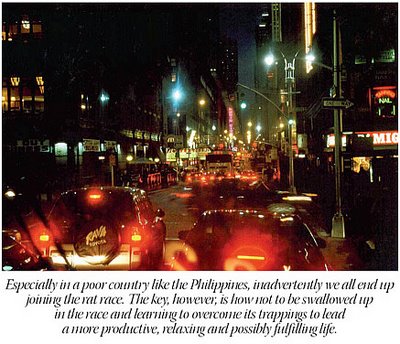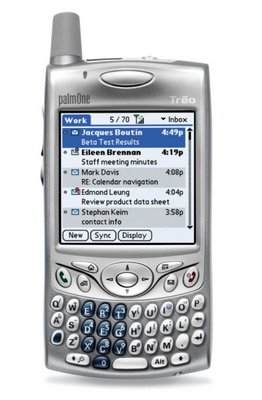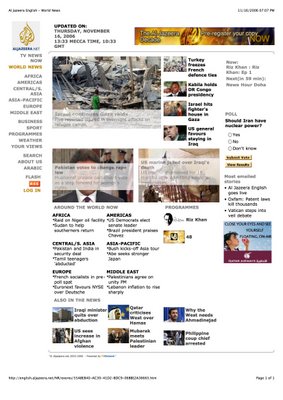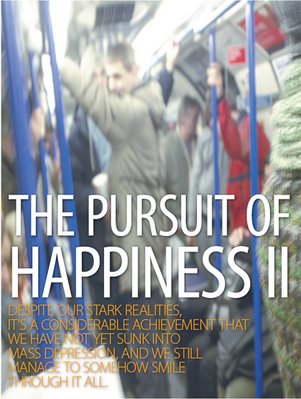 Something Like Life
Something Like Life
Nov. 3, 2006THE most popular course at Harvard University is no longer Introductory Economics — which it has been for the past 10 years—but a course called “Positive Psychology.” The course, where about 855 undergraduates were enrolled in the past semester, teaches students how to create “a fulfilling and flourishing life,” according to the course description. In other words, it teaches the students how to be happy.
How strange, don’t you think, that a course in an esteemed university would tackle a subject usually covered in indulgent self-help books or by fancy (read: expensive) motivational speakers?
But surprisingly, Harvard isn’t the only university that teaches such a course. According to a story in
The Boston Globe last March, around 100 campuses around the United States have been teaching Positive Psychology.
What is so compelling about this course?
At Harvard, considered the leader of the pack in this endeavor, the course is taught by 36-year-old Tal D. Ben-Shahar, a former national squash champion of Israel in the 1980s, and a Harvard alumnus himself. Besides the fact that one can hardly fail this course, it teaches students how to relax through meditation, cope with the daily stresses of student life (all those required readings, exams, papers, demanding professors), and how to appreciate the simple life.
“The goal is not constant ecstasy or gratification,” Ben-Shahar told London’s The Guardian in an interview last May. “It’s a deeper, more lasting, more meaningful flourishing. Pleasure and ecstasy can be part of a happy life, but they can also be part of a very unhappy life. A happy life will have the usual vicissitudes, and trying to avoid those, or hoping not to experience those, inevitably leads to unhappiness and frustration.”
The course is popular because, I guess, more and more people realize that while it’s cool to have lots of money and be financially stable, for example, it doesn’t necessarily make one happy. That in the end one’s emotional and psychological well-being is what’s most important. (Daniel Kahneman, PhD., a Princeton University researcher, and his colleagues actually published this theory in the June 30 issue of Science magazine. Kahneman cowon the Nobel Prize in 2002 for applying the principles of psychology to economics.)
Sure, we sometimes don’t have a lot of choices, especially in a poor country like the Philippines. Inadvertently, we all end up joining the rat race. The key, however, is how to not be swallowed up in the race and learning to overcome its trappings to lead a more productive, relaxing and possibly fulfilling life.
Like how many of us constantly strive toward perfection? The perfect diet, the perfect outfit, the perfect vacation, the perfect and most successful job? And, of course, when we don’t become thin overnight or achieve that promotion we have been lusting after for years, it throws us off-balance and makes us miserable.
Ben-Shahar teaches that what we should appreciate are the small, otherwise imperfect improvements… maybe the two pounds we lost today, or the P500 salary increase we received, instead of crying that we didn’t get the P1,000 we were gunning for. (A funny take on this is that Filipino joke about the employee complaining about his low salary. His boss says,
“May trabaho ka na, gusto mo pa ng sweldo?”)
Levity aside, many of us who have lived through the rebelliousness of the ’70s, the excesses of the ’80s, and the globalization in the ’90s, now in the new millennium we are all about trying to find some deeper meaning in our lives. Now more than ever, there is a constant pursuit for a healthier, more relaxed and less strenuous lifestyle.
I have friends in Boracay, for example, who chose to do what they love most—cooking, designing, scuba diving, meeting people, etc.—parlaying their own talents to set up small businesses and working for less income than many of them used to earn in large companies. They have realized that by simplifying their lives, they are able to live on less.
While not everything is perfect and they struggle along the way, problems never overwhelm them and they are calmed by the fact that tomorrow, the sun is going to shine again, the beach is still going to be powdery white, and the island’s waters still clear.
Ben-Shahar teaches his students to look at the bright side of life, and, yeah, to stop and smell the roses along the way. It doesn’t mean that we should try to avoid discouragements, but rather to learn to overcome them by embracing them. After all, one can’t feel truly happy unless he has known sadness, right?
So here’s some happiness tips that Ben-Shahar shared with
The Boston Globe:
1.
Give yourself permission to be human. When we accept emotions—such as fear, sadness or anxiety—as natural, we are more likely to overcome them. Rejecting our emotions, positive or negative, leads to frustration and unhappiness.
2.
Happiness lies at the intersection between pleasure and meaning. Whether at work or at home, the goal is to engage in activities that are both personally significant and enjoyable. When this is not feasible, make sure you have happiness boosters, moments throughout the week that provide you with both pleasure and meaning.
3.
Keep in mind that happiness is mostly dependent on our state of mind, not on our status or the state of our bank account. Barring extreme circumstances, our level of well-being is determined by what we choose to focus on (the half-full or the half-empty part of the glass) and by our interpretation of external events. For example, do we view failure as catastrophic, or do we see it as a learning opportunity?
4.
Simplify! We are, generally, too busy, trying to squeeze in more and more activities into less and less time. Quantity influences quality, and we compromise on our happiness by trying to do too much.
5.
Remember the mind-body connection. What we do—or don’t do—with our bodies influences our mind. Regular exercise, adequate sleep and healthy eating habits lead to both physical and mental health.
6.
Express gratitude, whenever possible. We too often take our lives for granted. Learn to appreciate and savor the wonderful things in life, from people to food, from nature to a smile.
(My column Something Like Life, is published every Friday in the Life Section of the BusinessMirror.)
 (Tish Leizens, left, is editor and publisher for Our House magazine, while her husband, Ed, serves as circulation director. Photo from the Pocono Record)
(Tish Leizens, left, is editor and publisher for Our House magazine, while her husband, Ed, serves as circulation director. Photo from the Pocono Record) (The Bushkill based publication Our House will debut in March. Photo from the Pocono Record)
(The Bushkill based publication Our House will debut in March. Photo from the Pocono Record)






